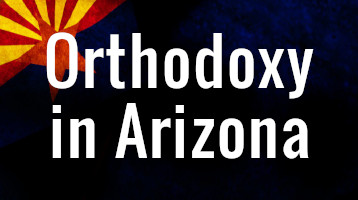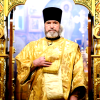![]()
Every Orthodox Christian is aware and generally knows the reason behind the fasts for Pascha and Christmas. But while they may know of the Dormition Fast, it is notable that some do not observe the fast, and more than a few question why it is there, not understanding its purpose.
Given the pervasive misunderstanding of the purpose of fasting itself, a refresher on its purpose is always a good idea. There is a perception that we should fast when we want something, as though the act of fasting somehow appeases God, and seeing us “suffer” gets Him to grant our request. Nothing can be further from the truth.
Fasting Pleases God?
It is not our fasting that pleases God, it is the fruits of our fast (provided we fast in the proper mind set, with alms and prayer, and do not merely diet) that please Him.
1) We fast, not to get what we want, but to prepare ourselves to receive what God wants to give us.
2) The purpose of fasting is to bring us more in line with another Mary, the sister of Lazarus, and away from their sister Martha, who in the famous passage was “anxious and troubled about many things.”
3) Fasting is intended to bring us to the realization of “the one thing needful.” It is to help us put God first and our own desires second, if not last. As such it serves to prepare us to be instruments of God’s will, as with Moses in his flight from Egypt and on Mt. Sinai, as well as our Lord’s fast in the wilderness. Fasting turns us away from ourselves and toward God.
4) Fasting during the Dormition Fast helps us become like the Theotokos, an obedient servant of God, who heard His word and kept it better than anyone else has or could.
So why do we fast before Dormition?
In a close-knit family, word that its matriarch is on her deathbed brings normal life to a halt. Otherwise important things (parties, TV, luxuries, personal desires) become unimportant; life comes to revolve around the dying matriarch. It is the same with the Orthodox family; word that our matriarch is on her deathbed, could not (or at least should not) have any different effect than the one just mentioned.
The Church, through the Paraklesis Service, gives us the opportunity to come to that deathbed and eulogize and entreat the woman who bore God, the vessel of our salvation and our chief advocate at His divine throne.
The Paraclesis Service
The Service of the Paraclesis to the Theotokos consists of hymns of supplication to obtain consolation and courage. It should be recited in times of temptation, discouragement or sickness. It is used more particularly during the two weeks before the Dormition, or Assumption, of the Theotokos, from August 1 to August 14. The theme of these Paraclesis Services centers around the petition.
“Most Holy Mother of God, save us”.
If you have a problem or if something is burdening your soul, if you feel spiritually uneasy and if you are not at peace with yourself and with those around you, then, you should come to the Church during the first fifteen days of August and ask for the intercessions of the Mother of God. Even if you are fortunate enough to be one of those very few who are at peace with themselves and with God, then those blessed ones should come to these services and thank God and His Blessed Mother for the blessings that they have bestowed upon you and your family.
Since these Paraclesis Services to the Theotokos are primarily petition for the welfare of the living, let the whole Church pray for you during the first fifteen days of August and especially on the Great Feast of the Dormition of the Theotokos on August 15th. Don’t let your laziness and your apathy cause you to miss this great blessing and inspiration that the Church can bestow upon you. Let the peace and holiness that only the Mother of God can give you enter into your life. “Let us lay aside all earthly cares,” and let us truly, during these fifteen days, participate in the fasting and prayer life of the Church so that we can “taste and see that the Lord is good” and so that we may fully experience the spiritual blessings that the Church offers to us at this holy time. “Blessed is he whom He shall find watching.” Come and pray to the Theotokos with us and with the Church and by her prayers and intercessions, may our souls be saved!
The Dormition fast comes down to us from the early days of Christianity.
We find a clear reference to the Dormition fast in a conversation of Leo the Great from around the year 450 A.D.
“The Church fasts are situated in the year in such a way that a special abstinence is prescribed for each time. Thus, for spring there is the spring fast ]—the Forty Days[Great Lent; for summer there is the summer fast… [the Apostles’ fast]; for autumn there is the autumn fast, in the seventh month [Dormition fast]; for winter there is the winter fast [Nativity fast].”
St. Symeon of Thessalonica writes that,
“The fast in August [Dormition fast] was established in honor of the Mother of God the Word; Who, foreknowing Her repose, ascetically labored and fasted for us as always, although She was holy and immaculate, and had no need for fasting. Thus, She especially prayed for us in preparation for being transported from this life to the future life, when Her blessed soul would be united through the Divine spirit with Her Son. Therefore, we also should fast and praise Her, emulating Her life, urging Her thereby to pray for us. Some, by the way, say that this fast was instituted on the occasion of two feasts—the Transfiguration and the Dormition. I also consider it necessary to remember these two feasts—one which gives us light, and the other which is merciful to us and intercedes for us.”
The Dormition fast is not as strict as the Great Fast, but it is stricter than the Apostle’s and Nativity fasts.
On Monday, Wednesdays and Fridays of the Dormition fast, the Church rubrics prescribe xerophagy, that is, the strictest fast of uncooked food (without oil); on Tuesdays and Thursdays, “with cooked food, but with no oil”; on Saturdays and Sundays wine and oil are allowed.
Until the feast of the Transfiguration of the Lord, when grapes and apples are blessed in the churches, the Church requires that we abstain from these fruits. According to the tradition of the holy fathers,
“If one of the brethren should eat the grapes before the feast, then let him be forbidden for obedience’s sake to taste of the grapes during the entire month of August.”
On the feast of the Transfiguration of the Lord, the Church rubrics allow fish. After that day, on Mondays, Wednesdays, and Fridays, the fruits of the new harvest would always be included in the meals.
The spiritual fast is closely united with the bodily, just as our soul is united with the body, penetrates it, enlivens it, and makes one united whole with it, as the soul and body make one living human being. Therefore, in fasting bodily we must at the same time fast spiritually:
“Brothers, in fasting bodily let us also fast spiritually, severing all union with unrighteousness,” the Holy Church enjoins us.
The main thing In fasting bodily is restraint from abundant, tasty and sweet foods; the main thing in fasting spiritually is restraint from passionate, sinful movements that indulge our sensual inclinations and vices. The former is renunciation of the more nourishing foods for fasting food, which is less nourishing; the latter is the renunciation of our favorite sins for exercise in the virtues which oppose them.
The essence of the fast is expressed in the following Church hymn:
“If you fast from food, my soul, but are not purified of the passions, in vain do we comfort ourselves by not eating. For if the fast does not bring correction, then it will be hateful to God as false, and you will be like unto the evil demons, who never eat.”
The Great fast and the Dormition fast are particularly strict with regard to entertainment—in Imperial Russia even civil law forbade public masquerades and shows during these fasts.
The Dormition fast begins on the feast of the “Procession of the Wood of the Life-Giving Cross of the Lord.”
In the Greek horologion of 1897, the origin of this feast is explained:
“Because of the illnesses that occur very often during August, the custom was established in Constantinople of processing the Precious Wood of the Cross through the roads and streets to sanctify places and prevent disease. On the eve of the feast it was carried out of the royal treasury and placed upon the holy table of the Great Church (the Hagia Sophia, dedicated to the Holy Wisdom of God). From that day until the Dormition of the Most Pure Theotokos, lityas were served throughout the city, and the Wood of the Cross was then offered to the people for veneration. This was the procession of the Precious Cross.”
In the Russian Orthodox Church, this feast was linked with the remembrance of the Baptism of Russia in 988. The memory of the day of the Baptism of Russia was preserved in the Chronologies of the sixteenth century, which state that, “Grand Prince Vladimir of Kiev and All Rus was baptized on August 1.” In the Discussion of active rites of the Holy Catholic and Apostolic Church on the Dormition, written in 1627 at the request of Patriarch Philaret of Moscow and All Russia, the feast on August 1 is described: “During the procession on the day of the Precious Cross, there is a blessing of the waters for the enlightenment of the people, throughout the cities and villages.”
On this day, a feast was established of the All-Merciful Savior Christ God, and of the Most Pure Virgin, in honor of the victory of Grand Prince Andrei Bogolubsky over the Volga Bulgars, and of the Greek Emperor Michael over the Saracens.
According to Orthodox Church tradition, on this day the Cross is venerated (according to the rubrics of the Sunday of the Veneration of the Cross during Great Lent), and a lesser blessing of the waters is served. Together with the blessing of the waters, new honey is also blessed. (This is where the Russian folk name for the feast, “Savior of the honey,” comes from.)



